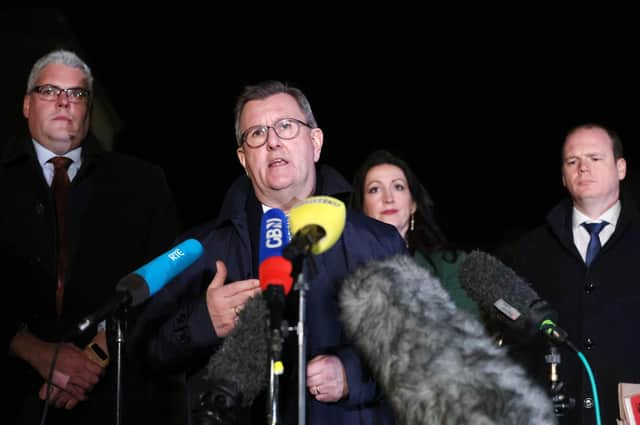Donaldson says decision time is approaching on Stormont return - but EU law remains a concern for some in DUP


Sir Jeffrey Donaldson says while progress has been made over recent weeks, he won’t be drawn on a timescale for concluding the talks.
On Wednesday the Prime Minister said he was ready to move “at pace” on legislation to protect Northern Ireland’s place in the UK internal market.
Advertisement
Hide AdAdvertisement
Hide AdSpeaking to the BBC yesterday, Mr Donaldson said progress was still needed “on the movement of goods between Great Britain and Northern Ireland”. He pointed to NISRA figures released this week which showed trade from Great Britain had fallen, but trade with the Republic had increased.
“In terms of where that process is, there are still some issues we are engaged with the Government on, but undoubtedly we are approaching the time when we will be able to examine where we have got to, the progress that has been made and perhaps come to some decisions.
“But as to the timescale on that, that depends on a number of things, that process is not yet completed.
“Very often it is the final stages of a negotiation that can be the most challenging and there are still matters that need to be finalised.”
Advertisement
Hide AdAdvertisement
Hide AdSir Jeffrey told the BBC’s Sarah Brett: “I continue to keep my party officers fully informed of what is happening in this process and obviously they will have a major say whenever the moment comes for a decision to be taken.
“The DUP has made its position clear – and that position is shared right across the party – that we want to see the political institutions restored on a sustainable basis.
Mr Donaldson added: “I haven’t come this far to plan for failure, I am planning to get the outcome that we need, to see Northern Ireland on a sustainable footing.
For any deal to be approved by the DUP, it will have to first get the approval of the party officers – and then the wider party executive.
Advertisement
Hide AdAdvertisement
Hide AdThe issue of EU law applying in Northern Ireland will be a key test for a number of DUP representatives, with concerns emerging about other looming conflicts between UK and European laws in the province.
The Windsor Framework not only applies certain EU trade rules to Northern Ireland, but also EU rights legislation. It requires the UK to ensure no “diminution” of rights after Brexit.
This week, the DUP MP Sammy Wilson raised concerns about the combined impact of the Windsor Framework and the government’s Rwanda Bill – something he said could create ID checks on people travelling within the UK.
The government has insisted its Rwanda bill will apply to the whole of the United Kingdom – but for over a week now it has failed to answer a question from the News Letter about whether it will rule out checks on people travelling between Northern Ireland and the rest of the UK.
Advertisement
Hide AdAdvertisement
Hide AdThe DUP peer Lord Dodds posted on X, formerly Twitter, saying “the Protocol / Windsor Framework leaves NI under EU jurisdiction thus rendering protections of Rwanda Bill useless in NI. The Irish Sea Border is not just about trade. It must go”.
There are concerns within the party that the continuation of EU rights legislation under the Windsor Framework will be an ongoing source of friction – and risk further isolating Northern Ireland within the UK.
The EU was clear this week that it expected the UK to uphold European rights under the deal. A spokesperson told the News Letter: “The Windsor Framework is to be implemented in full, and in good faith – which includes the provisions on ‘Rights of individuals’ (Article 2) of the Windsor Framework”.
Brussels has previously ruled out any renegotiation of the Windsor Framework, but refused to comment on whether there is scope for changes to customs processes and physical checks on goods entering Northern Ireland from Great Britain.
Advertisement
Hide AdAdvertisement
Hide AdThe TUV released a video on social media yesterday showing what it argued was the 7 steps to Irish Unity created by the Protocol. They included breaking the economic link with Great Britain, moving the trade border to the Irish Sea and having Stormont implement the Protocol. The party argues these are all steps towards creating an all Ireland economy.
Comment Guidelines
National World encourages reader discussion on our stories. User feedback, insights and back-and-forth exchanges add a rich layer of context to reporting. Please review our Community Guidelines before commenting.